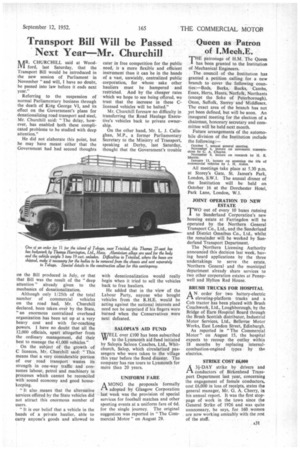Transport Bill Will be Passed Next Year—Mr. Churchill
Page 33

If you've noticed an error in this article please click here to report it so we can fix it.
MR. CHURCHILL said at Woodford, last Saturday, that the Transport Bill would be introduced in the new session of Parliament in November "and will, I have no doubt, be passed into law before it ends next year."
Referring to the suspension of normal Parliamentary business through the death of King George VI, and its effect on the Government's plans for denationalizing road transport and steel, Mr. Churchill said: " The delay, however, has enabled both these complicated problems to be studied with deep attention."
He did not elaborate this point, but he may have meant either that the Government had had second thoughts on the Bill produced in July, or that that Bill was the result of the " deep attention" already given to the mechanics of denationalization.
Although only 1/25th of the total number of commercial vehicles on the road had, Mr. Churchill declared, been taken over by the State, "an enormous centralized overhead organization has been set up at a very heavy cost and with far-reaching powers. I have no doubt that all the 12,000 officials, apart altogether from the ordinary management, did their best to manage the 41,000 vehicles."
On the subject of the growth of C licences, Mr. Churchill said: "This means that a very considerable portion of our road transport wastes its strength in one-way traffic and consumes labour, petrol and machinery in processes which cannot be reconciled with sound economy and good housekeeping.
" It also means that the alternative services offered by the State vehicles did not attract this enormous number of
users.
It is our belief that a vehicle in the hands of a private haulier, able to carry anyone's goods and allowed to cater in free competition for the public need, is a more flexible and efficient instrument than it can be in the hands of a vast, unwieldy, centralized public corporation, for whose sake other hauliers must be hampered and restricted. And by the cheaper rates which we hope to see being offered, we trust that the increase in these Clicensed vehicles will be halted."
Mr. Churchill foresaw no difficulty in transferring the Road Haulage Executive's vehicles back to private ownership.
On the other hand, Mr. L. J. Callaghan, M.P., a former Parliamentary Secretary to the Ministry of Transport, speaking at Derby, last Saturday, thought that the Government's trouble with denationalization would really begin when it tried to sell the vehicles back to free hauliers.
He added that in the view of the Labour Party, anyone who bought vehicles from the R.H.E. would be acting against the national interests and need not be surprised if his fingers were burned when the Conservatives were next defeated.
SALOPIA'S AID FUND
WELL over £100 has been subscribed to the Lynmouth aid fund initiated by Salopia Saloon Coaches, Ltd., Whitchurch, Salop. which circularized passengers who were taken to the village this year before the flood disaster. The company has run tours to Lynmouth for more than 20 years.
UNIFORM FARE
AMONG the proposals formally adopted by Glasgow Corporation last week was the provision of special services for football matches and other sporting events at a uniform fare of 6d. for the single journey. The original suggestion was reported in "The Commercial Motor" on August 29.




















































































